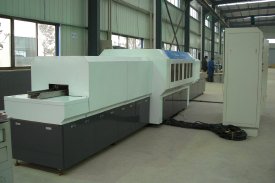Aug 24 2010
The Western Hemisphere's first high-temperature (1500 degrees C) continuous production microwave furnace is now fully functional at New York's NanoMaterials Innovation Center (NMIC), a wholly owned subsidiary of Alfred Technology Resources, Inc. (ATRI), near the campus of Alfred University.
The announcement came from Spheric Technologies, Inc., the Arizona company that sold the SPHERIC/SYNO-THERM system and that has been providing assistance with set-up, training and beta testing.
Joseph Hines, Spheric Technologies Chairman and CEO, said, "This installation is providing valuable exposure for our microwave furnace technology. The NanoMaterials Innovation Center, a magnet for commercial R&D, is the ultimate showcase for our cost-cutting microwave processing system. We are delighted to be associated with an institution that is so highly regarded by academia and industry."
 SPHERIC microwave furnace.
SPHERIC microwave furnace.
In Asia, continuous microwave furnaces are used in the chemical synthesis of phosphors for electronics, lighting materials and more, and for sintering electronic components and other critical ceramic items. Penn State University and Japan's National Institute for Fusion Science report that microwave furnaces typically use up to 80% less energy than conventional furnaces - producing stronger, finer-grained parts with less deformation and cracking in as little as one-tenth the time. Spheric Technologies' continuous and batch microwave furnaces are also well-suited for the sintering of certain powder metal and ceramic materials that require high-temperature processing.
A variety of American companies are using the Alfred furnace for proprietary microwave research. For example, Spheric Technologies is performing contract research on the production of ceramic materials for use in the natural resources development industry. Another company is scheduled this month to gauge the system's utility in producing cement, evaluating energy, time and production cost advantages. A major metals supplier plans to conduct its own metallurgy tests using the furnace. In each case, non-disclosure agreements shield the companies as they evaluate microwave processing to gain a competitive edge in their respective industries.
Alfred University is the most prestigious ceramics school in the country, with a history of collaborating with industry to pioneer and promote the adoption of innovative technologies. The NMIC provides a wide range of cutting-edge microwave sintering and manufacturing equipment. Researchers will use the Spheric Technologies system to synthesize and consolidate nano-sized ceramic powders into multi-layer and monolithic ceramics, while retaining the enhanced properties associated with nano-structured materials and for other high-temperature materials processes.
Jon Wilder, Executive Director of Alfred Technology Resources, commented, "The collaborative efforts of ATRI and its two stakeholders, Alfred University and Corning Incorporated, have enabled the creation of the NanoMaterials Innovation Center. Our vision is to offer a neutral partnering ground to academia and industry for partnering on R&D projects, to promote technology transfer and assist new start-ups that will in turn utilize the incubator and create jobs in the region. The NMIC will be a premier location for this type of R&D due to the unique combination of equipment available in one location and a cost-saving factor to companies who would otherwise need to invest substantial dollars to conduct this type of research. Being able to offer use of highly advanced equipment, such as the Spheric Technologies continuous microwave furnace, brings exciting opportunities for groundbreaking technology development."
Source: http://www.spherictech.com/